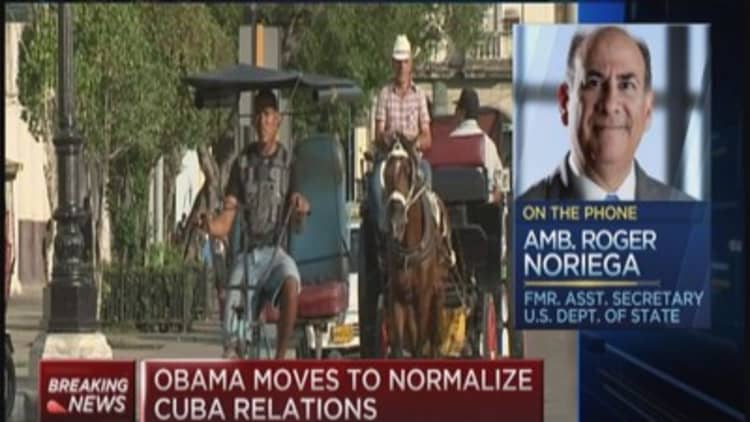
Any move by the United States to normalize relations with Cuba without a regime change will strengthen the hand of that country's leadership, experts told CNBC.
In a speech to the nation, President Barack Obama on Wednesday outlined a plan to overhaul its relations with Havana. The address followed the release of American USAID subcontractor Alan Gross, who was held in Cuba for five years, in exchange for three Cubans imprisoned in the United States. Cuba also released a U.S. intelligence agent.
Read More US to embark on massive overhaul of US-Cuba relations: Officials
Former U.S. Assistant Secretary of State Roger Noriega told CNBC's "Squawk on the Street" the president's proposal to renew relations will restore prestige to what he called a "deadbeat dictatorship," referring to the government of President Raul Castro.
"Doing normal business with that regime makes no sense based on one hostage release," said Noriega, who served as assistant secretary under President George W. Bush. "Unilateral concessions resuscitates a dictatorship that's drawing its last breath."
Normal economic relations should only used as leverage with a transitional government to ensure that any changes in Cuba are broad, profound and irreversible, he added.
Addressing opponents to the plan, Obama said he respected their passion and shared their commitment to liberty and democracy, but said the question is how America holds up its commitment.
"I don't believe we can do the same thing for five decades and expect a different result," he said.

The exchange of Gross for the Cuban prisoners is concerning because the trade was not equivalent, said Jose Azel, a professor at the University of Miami who has written extensively on Cuba.
"Alan Gross committed what can only be accounted for in most countries of the world as nothing more than a customs infraction, and to exchange him for these three convicted spies really does not set a good precedent going forward," Azel told "Squawk Alley."
Gross was apprehended in Havana in 2009 with satellite and communications equipment in his possession and charged with espionage.
Read MoreObama-Castro: Has 'the fever' broken?
Azel sees Cuba remaining committed to a hegemonic, one-party political system and a centrally planned economy.
As for whether free markets are more likely to develop in Cuba without an embargo, Azel said he doesn't expect the average Cuban to benefit from a normalization of relations.
"When you're dealing with totalitarian state that controls fundamentally 85 percent of the economy, the financial benefits do not flow to the people. They flow to the state," he said.


